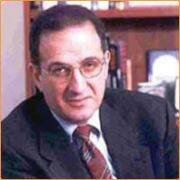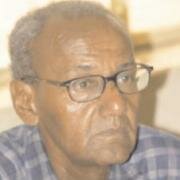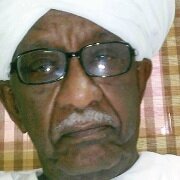As I have written elsewhere Sayed Alsadiq Al-Mahdi (before he became Imam)was the elected PM
.He took the initiative of inviting the whole Executive Committee of Khartoum University Students Union to his office.He offered us tea and biscuits and told us that he respected and valued the opinions and contributions of students and young people. On a second occasion, when he was no longer in office he welcomed me and some members of my family to his Mulazmeen home. I have also met many British and other visitors to the Sudan who mentioned his hospitality. He also reads a lot and writes more than is usual among politicians and deserves veneration for these characteristics and ,of course, for being the descendant of our great 19 th C national hero ,Mohamed Ahmed AlMahdi. He is, however, also an active and sometimes controversial politician. In his latest SUNA interview(30th July, by AlTayeb Awad AlKareem, AlFatih AlSayed and Ibrahim Musa) he demonstrates his vast experience and well-articulated arguments.
He is quite right in defending the record of the much maligned Sudanese elite. Sweeping and generally unfair condemnation of them doesn't take into consideration the surrounding challenges or their tangible successes. We should be proud of the fact that they knew the difference between Nazi Germany with its fascist allies and the Democratic Allies who included Britain. They saw no contradiction between calling for self-determination / independence and mobilising the population in support of the British war effort. Their role was the opposite of sympathy for the Nazis in the wider Middle East. Until his last days, the poet Nazar Qabbani expressed views that prompted his UK- living niece to scold him publicly. Some young Sudanese journalists repeat the stance of left-leaning British liberals who disdain Sudanese attainment of full independence through the ballot box and a vote in parliament on 19th December 1955.Only protracted bloodshed would earn the title of "struggle" for them. Unfortunately,a former governor of Khartoum has removed (without any consultation with historians or other relevant authorities) the Unknown Soldier's obelisk that was erected on Victoria Avenue-now Palace Avenue to honour the martyrs of the Second World War. As far as the first civil war is concerned, many Sudan critics conveniently overlook the fact that it began in August 1955 ,four months before independence. The allegation that the behaviour or decisions of the elite resulted in the outbreak of the civil war is evidently flawed because they were not in control. Even the admittedly negligible number of Sudanisation jobs given to Southerners to replace the departing British and Egyptians was not an exclusively Sudanese decision.With the wisdom of hindsight ,a quota should have been allocated to Southerners who should have been sent abroad for training and qualifications.
Another fallacy is the allegation that the lack of development in Southern Sudan after independence was intentional or part of a conspiracy. Two points can be raised in this respect. As Richard Dowden wrote when he was at the Royal African Society ,the cash-strapped colonial administration controlled the South "and let it rot". The politically motivated missionaries had money for churches; none for roads or infrastructure.
When the 1955 fighting began, the rebels destroyed development projects. Funds in Khartoum had to be allocated to security not development all over the country. No major private sector, Sudanese or foreign, was attracted to Southern Sudan during the first or second civil war. Imam AlSadiq is quite right in defending the Sudanese elite in the face of unfair criticism. They had limitations and formidable handicaps.
He was however on shaky ground when he talked about Drs Garang and Mansour Khalid. To say that Mansour Khalid "misled "Garang is wide of the mark. It is true that Mansour Khalid is a distinguished writer. His classical Arabic prose is second only to that of Dr Abdullahi Ali Ibrahim whose advantage is a sense of humour and the appropriate inclusion of informal or slang words. Dr Mansour's prose is, by comparison, stilted. Efficient; but cold. Part of the explanation is that he doesn't write out of conviction; but to fulfill a job to which he was recruited. Writing is an intimate psychological activity. In the ancient fable the rabbit turns to the panting dog and taunts him by saying:You will never catch me because you are running for your master while I am running for myself and my life. Mansour Khalid was not in a position to "mislead "his master John Garang because he was the spin doctor for Garang and was not an original analyst.Indeed Garang himself was derivative.The Centre-periphery dichotomy was the brain child of David Ben -Gurion as the Israeli academic Avi Shlaim has documented and as the former Mossad leader Yossi Alpher has confirmed in his book"Periphery:Israel's Search for Middle East Allies".In my review of Alpher's book I have quoted what Daniel Pipes has written in the Washington Times that the secession of Southern Sudan was a result of Ben-Gurion's "Periphery Strategy" and boasted that Israel's "long-term investment has paid off".The investment included training John Garang and exposing him to the Ben-Gurion's strategy which aimed at inciting minorities in Arab countries in order to weaken them and isolate the Palestinians from any meaningful support.The word periphery is still the mantra that is repeated by armed groups in the Sudan. Imam AlSadiq's analysis of the strategy of SPLM and its "misled" leader raises a simple question:Why is he allying himself with SPLM-N now? Has he forgotten that Dr Garang has rejected his 1986 peace offers?
Does he believe their call for "democracy"?Can't he see the New Sudan which they are misruling? These questions lead us to conclude that the Imam's declaration in the interview that he is about to step down will be the most inspired one for his party and for the political landscape,despite his laudable personal generosity and hospitality to friends and critics.
-
Periscope: Academic Study on “Why Leaders Lie?” (5)
-
Feel It: HepatitisNext >



